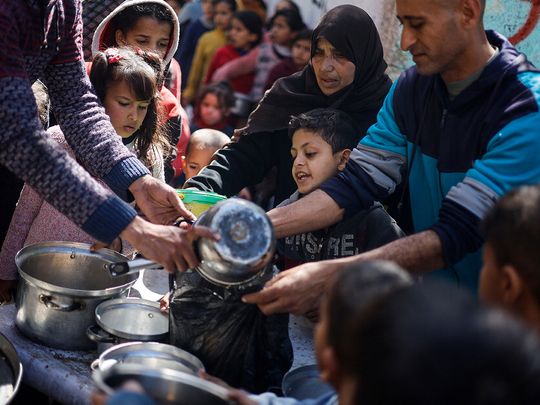
Here’s one sad truth: The humanity of Gazans has been reduced to such a fragment that they are now beginning to echo, in their desperate appeals for succour, the vatic howl found in the poem, The Great Tablecloth, by Pablo Neruda, Chile’s poet laureate and Nobel Prize winner, “For now I ask no more than the justice of food”.
In an ethical, fair minded and sane world, no people should have to earn the right to eat. In our Holy texts, food is called ni’meh, or a blessing from God, and when you deny people access to it, you commit a sin. Equally, in international law, when you do that, using food, say, as a weapon of war, you commit a war crime.
Israel’s restrictions on Gazan aid deliveries have taken the people of Gaza over the brink of famine.
Professor Alex de Waal, an expert on humanitarian crisis and international law, and author of Mass Starvation: The History and Future of Famine, was one among several scholars quoted in a piece in the New York Times on Saturday saying that “It’s been generations since the world has seen this degree of food deprivation in war”.
As savagery was set loose on their heels five months ago, Gazans have had to endure a multitude of horrors, but one of them, the mass starvation they are now being subjected to, is one beyond all rational understanding — one that requires no less than a reorientation of our consciousness and of the linear metaphors around which we organise our perceptual images of the objective world.
Starvation as weapon of war
Look, there have been food crises associated with conflict in modern as in ancient times, but what makes Gaza unique is the scale and speed of the destruction of those structures in the Strip that are necessary for people’s survival. Add to that the rigour with which Israel has enforced its siege, effectively sealing the territory from the outside world, leaving its 2.4 million wretched denizens with no recourse to find food elsewhere — or from having it delivered to them.
The famine caused by the enforcement of that siege, experts now universally agree, surpasses any other case of man-made famines in the last 75 years, and it is a deliberate and calculated extension of Israel’s punitive policy, which includes the employment of starvation as weapon of war — and vengeance — a policy it has pursued literally from day one of its military assault on the densely populated Strip.
Keep in mind it was on Oct. 8, a day after the war began, when Israel ordered that a complete siege be placed there, and Defence Minister Yaor Gallant, who then identified Palestinians a bunch of “human animals”, called for the implementation of his four infamous “nos” — namely that “no electricity, no food, no water, no fuel” would be allowed into the little enclave. And, several days later, Itamar Ben Gvir, Israel’s national security minister, wrote on X, “The only thing that needs to enter Gaza are hundreds of tons of explosives from the Air Force and not an ounce of humanitarian aid”.
Other politicians not only echoed that grotesque call, but they also demanded that Gaza be turned into a “slaughterhouse”.
There’s starvation in Gaza today. Yet Israeli officials continue to deny, with a straight face, that they are impeding, or Heavens, in any way blocking, the delivery of humanitarian aid to Gazans.
Why adopt such an improbable posture, even when the evidence points in the opposite direction?
Well, it’s elementary, my Dear Watson.
“If famine happens, somebody is to blame. And if you can get some international body, which is seen as scientific and objective, to admit that there is famine,” Professor Cormac O’Grada, a historian of famine and professor at University College Dublin, was quoted saying by the New York Times last week, “then it is very, very serious for the people who are seen to have caused the famine”.
And those who cause famines, by using starvation as a weapon of war, commit, in the eyes of international law, a war crime.
You see, prohibition of the starvation of civilians as a method of warfare entered international law in 1977, with an additional protocol to the Geneva Convention. In 1998, the Rome Statute, which created the International Court of Justice, made it a war crime to use starvation of civilians as a military tactic in military conflict, with the crime described as an act that deprives people not just of food but also of water, medicine and shelter. And in 2018, the Security Council unanimously adopted Resolution 2417, which equally prohibited the use of starvation in conflict, adding that a case in which that conflict threatens to create wide food insecurity should be “swiftly” brought for consideration by its members.
Israel’s tactic here? Deny, deny and deny some more, even in the wake of the food carnage last week, where 115 people were killed and 760 injured when Israeli troops used live fire while hungry and desperate Gazans were gathering around food trucks, in this tormented strip of land where starvation gnaws daily at children, as on adults, like a raw wound, starvation being a condition that, when prolonged, is known to soften the skeleton as the body excavates minerals in the bones and brain cells begin to die.
In the name of human decency, enough!
— Fawaz Turki is a noted academic, journalist and author based in Washington DC. He is the author of The Disinherited: Journal of a Palestinian Exile










